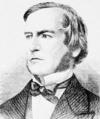- Boole, George
-
born Nov. 2, 1815, Lincoln, Eng.died Dec. 8, 1864, Ballintemple, Ire.British mathematician.Though basically self-taught and lacking a university degree, in 1849 he was appointed professor of mathematics at Queen's College in Ireland. His original and remarkable general symbolic method of logical inference is fully stated in Laws of Thought (1854). Boole argued persuasively that logic should be allied with mathematics rather than with philosophy, and his two-valued algebra of logic, now called Boolean algebra, is used in telephone switching and by electronic digital computers.
 George Boole, engraving.Courtesy of the trustees of the British Museum; photograph, J.R. Freeman & Co. Ltd.
George Boole, engraving.Courtesy of the trustees of the British Museum; photograph, J.R. Freeman & Co. Ltd.* * *
▪ British mathematicianborn November 2, 1815, Lincoln, Lincolnshire, Englanddied December 8, 1864, Ballintemple, County Cork, IrelandEnglish mathematician who helped establish modern symbolic logic and whose algebra of logic, now called Boolean algebra, is basic to the design of digital computer circuits.Boole was given his first lessons in mathematics by his father, a tradesman, who also taught him to make optical instruments. Aside from his father's help and a few years at local schools, however, Boole was self-taught in mathematics. When his father's business declined, George had to work to support the family. From the age of 16 he taught in village schools in the West Riding of Yorkshire, and he opened his own school in Lincoln when he was 20. During scant leisure time he read mathematics journals in the Lincoln's Mechanics Institute. There he also read Isaac Newton (Newton, Sir Isaac)'s Principia, Pierre-Simon Laplace (Laplace, Pierre-Simon, marquis de)'s Traité de mécanique céleste, and Joseph-Louis Lagrange (Lagrange, Joseph-Louis, comte de l'Empire)'s Mécanique analytique and began to solve advanced problems in algebra.Boole submitted a stream of original papers to the new Cambridge Mathematical Journal, beginning in 1839 with his “Researches on the Theory of Analytical Transformations.” These papers were on differential equations (differential equation) and the algebraic problem of linear transformation, emphasizing the concept of invariance. In 1844, in an important paper in the Philosophical Transactions of the Royal Society for which he was awarded the Royal Society's first gold medal for mathematics, he discussed how methods of algebra and calculus might be combined. Boole soon saw that his algebra could also be applied in logic.Developing novel ideas on logical method and confident in the symbolic reasoning he had derived from his mathematical investigations, he published in 1847 a pamphlet, “Mathematical Analysis of Logic,” in which he argued persuasively that logic should be allied with mathematics, not philosophy. He won the admiration of the English logician Augustus De Morgan (De Morgan, Augustus), who published Formal Logic the same year. On the basis of his publications, Boole in 1849 was appointed professor of mathematics at Queen's College, County Cork, even though he had no university degree. In 1854 he published An Investigation into the Laws of Thought, on Which Are Founded the Mathematical Theories of Logic and Probabilities, which he regarded as a mature statement of his ideas. The next year he married Mary Everest, niece of Sir George Everest (Everest, Sir George), for whom the mountain is named. The Booles had five daughters.One of the first Englishmen to write on logic, Boole pointed out the analogy between algebraic symbols and those that can represent logical forms and syllogisms, showing how the symbols of quantity can be separated from those of operation. With Boole in 1847 and 1854 began the algebra of logic, or what is now called Boolean algebra. Boole's original and remarkable general symbolic method of logical inference, fully stated in Laws of Thought (1854), enables one, given any propositions involving any number of terms, to draw conclusions that are logically contained in the premises. He also attempted a general method in probabilities, which would make it possible from the given probabilities of any system of events to determine the consequent probability of any other event logically connected with the given events.In 1857 Boole was elected a fellow of the Royal Society. The influential Treatise on Differential Equations appeared in 1859 and was followed the next year by its sequel, Treatise on the Calculus of Finite Differences. Used as textbooks for many years, these works embody an elaboration of Boole's more important discoveries. Boole's abstruse reasoning has led to applications of which he never dreamed: for example, telephone switching and electronic computers use binary digits and logical elements that rely on Boolean logic for their design and operation.Additional ReadingDesmond MacHale, George Boole: His Life and Work (1985), is an accessible biography.* * *
Universalium. 2010.
